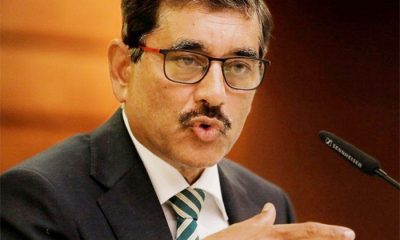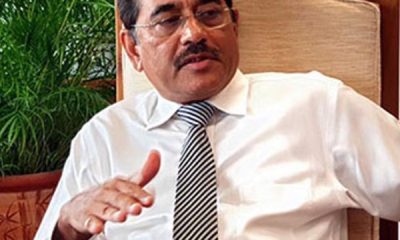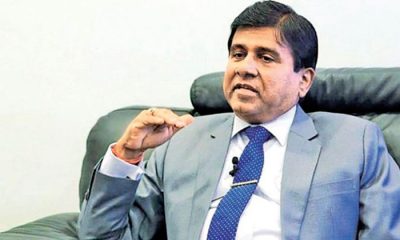News
CB Governor outlines importance of DDR to protect banks and save overall economy

Sri Lankan state can’t allow even a small bank to collapse because that will trigger a bank run with a devastating impact on the economy. Governor of the Central Bank of Sri Lanka CBSL) Dr. Nandalal Weerasinghe said, on Thursday night, taking part in a televised discussion.
Dr. Weerasinghe said that Domestic Debt Restructuring (DDR) would have a negative impact on the balance sheet of the Central Bank of Sri Lanka (CBSL) but by doing this the CBSL had ensured that depositors and pension funds were not adversely affected.
The CBSL Governor said that the stability of the banking sector was of utmost importance to the Central Bank during DDR and that was the reason why it insisted on a five-day banking holiday.
“As everyone knows, Treasury bills and Treasury bonds will be affected by restructuring. Pension funds, banks and private individuals have bought most of these bonds and bills. Treasury bills and treasury bonds are traded every day. Shares of banks are traded on the stock exchange every day. When there is uncertainty about bank assets and Treasury bills and Treasury bonds, this allows some people to manipulate the system. We had to stop that until DDR was done. We need approval by Cabinet, parliamentary committees and Parliament. Both the stock market and bond market must not be operational during this time of uncertainty,” he said.
Dr. Weerasinghe said that by giving banks five days, the government had given space for clarity and transparency, which would allow markets to function optimally. He added that until Parliament approved the DDR, there was also uncertainty and that was why Parliament was meeting during holidays for the first time in Sri Lankan history.
He noted that there were 57 million accounts in Sri Lankan banks and that the total deposits were worth over 15 trillion rupees.
“There was speculation about interest rates, haircuts, etc. The banks have invested in bills and bonds. About 36 trillion rupees have been invested in treasury bills and bonds. We have taken off treasury bills and bonds owned by banks from DDR. There is a good reason for that. Banks pay about 50 percent of their income as tax. Banks could not recover loans of about one trillion during the economic crisis. Moratoriums given during COVID also affected the banks. There was no reason to burden them more. We can’t allow even a small bank to collapse because that will trigger a bank run and that will have a devastating impact on the economy,” he said.
Dr. Weerasinghe said that superannuation funds including the Employees’ Provident Fund (EPF) and the Employees’ Trust Fund (ETF) were subject to a 14% tax rate, which was lower than the tax rate imposed on banks.
The DDR proposes the recalling of all existing Treasury bonds from those funds and issuing new bonds in return and those who chose to participate in the Treasury bond exchange had the option of paying a 30% tax instead of the standard 14 percent tax, the CBSL chief said.
“Superannuation funds pay the government 14 percent a year as tax whereas banks pay 50 percent, personal income tax is 36 percent and corporate tax is 28 percent. We need superannuation funds to make a contribution by increasing the duration of bonds and bills and by a reduction in the interest rates they receive. The EPF holders will not be penalised in any way and the interest rates they receive will remain at about 9 percent, which is the rate they had received in the past years on average,” he said.
The CBSL Governor said that due to high inflation, the real value of deposits had reduced. That was why controlling inflation was important and a main responsibility of the Central Bank, he said. Dr. Weerasinghe said the CBSL actions had helped reduce inflation to about 20 percent and inflation would be reduced to about 10 percent during the next two months.
“If we had not stepped in and stemmed the tide of inflation, the value of almost everything would have been wiped out. This is why we increased interest rates. We have also reduced money printing. Money printing means the CBSL increasing the amount of cash circulating in the economy. This is what we did in 2020-early 2022. This is why inflation rose to 70 percent and CBSL holds close to 2.6 billion treasury bills. We have maintained this by stopping unnecessary money printing. We reduced the expansion of credit, that’s why inflation has dropped,” he said.
The CBSL had purchased Treasury bills worth almost 2.6 trillion from the government, and the CBSL was allowing the government to pay back the money in 15 years instead of one year. The government has to pay the CBSL an additional one trillion given as advances. That, too, would be subjected to the above-mentioned concession, Dr. Weerasinghe said. “This will have a serious impact on the balance sheet of the CBSL. But we are in a better position to manage this because we are a special institution.
“The Treasury bills CBSL has taken is the biggest contributor to the DDR. We take this burden so that the deposits of the people are not affected. We are protecting the banking sector. Furthermore, we have rebuilt the trust in the banking sector.”
Treasury Secretary Mahinda Siriwardana said that Sri Lanka’s economic situation had improved, but there was still a long way to go for the country. In mid-2022, state income wasn’t even enough to cover the basic payments the government had to make, i. e. salaries, pensions, welfare, etc., Siriwardana said, adding that thus the Central Bank had been compelled to issue a lot of Treasury bills to find the money needed by the government.
“We could not borrow from foreign sources. The amount of bills has risen to about 2.6 trillion. We can’t go on doing this. Our budgetary and tax proposals last year were to increase income and reduce expenses,” he said,
Siriwardana said the government had to pay significant amounts of funds to pay interest and debt. Sri Lanka only stopped making some external debt repayments in April 2022, but the government kept on paying loans the country had taken from multilateral organisations, like ADB.
“Not only that, but we need to pay for Treasury bonds and bills. Interest and debt repayments apply continuous pressure on us. DDR aims to reduce these pressures by extending the maturity period, reducing interest rates, and convincing people to take a haircut. Our gross financing need compared to GDP is about 34 percent. Once DDR is done, this is reduced to about 13 percent. This is a 20 percent drop, and we have to pay less interest and debt. We can use the savings for other things. We will receive 700 million dollars from the World Bank and with all these things will improve. We can spend more on health, education and welfare. To achieve this, we need DDR and external debt restructuring,” he said.
R.H.S. Samaratunga, Senior Advisor to the President, also addressing the nation, said that there had been many issues with the Sri Lankan economy for a long time, and things became extremely bad in the past few years due to a combination of wrong economic policies of the Gotabaya Rajapaksa administration as well as developments that took place internationally. By early 2022, the economy had spiralled out of control.
“The economy shrunk, and we had to default in April 2022. There were no feasible alternatives to defaulting, and the government went to the IMF. Sri Lanka held discussions with our creditors for seven months to obtain credit assurances from them. IMF funding only came after we obtained credit assurances from our creditors. Sri Lanka’s total debt stock is over 83 billion US dollars. Out of this, domestic debt is about 42 billion. This debt has to be restructured so that the county can move on,” he said. (RK)
News
PM returns to the island

Prime Munister Dr Harini Amarasuriya returned to the island this (23rd) morning after attending the World Economic Forum in Davos, Switzerland,
News
Navy divers restore sluice gate of Bomburuella Reservoir
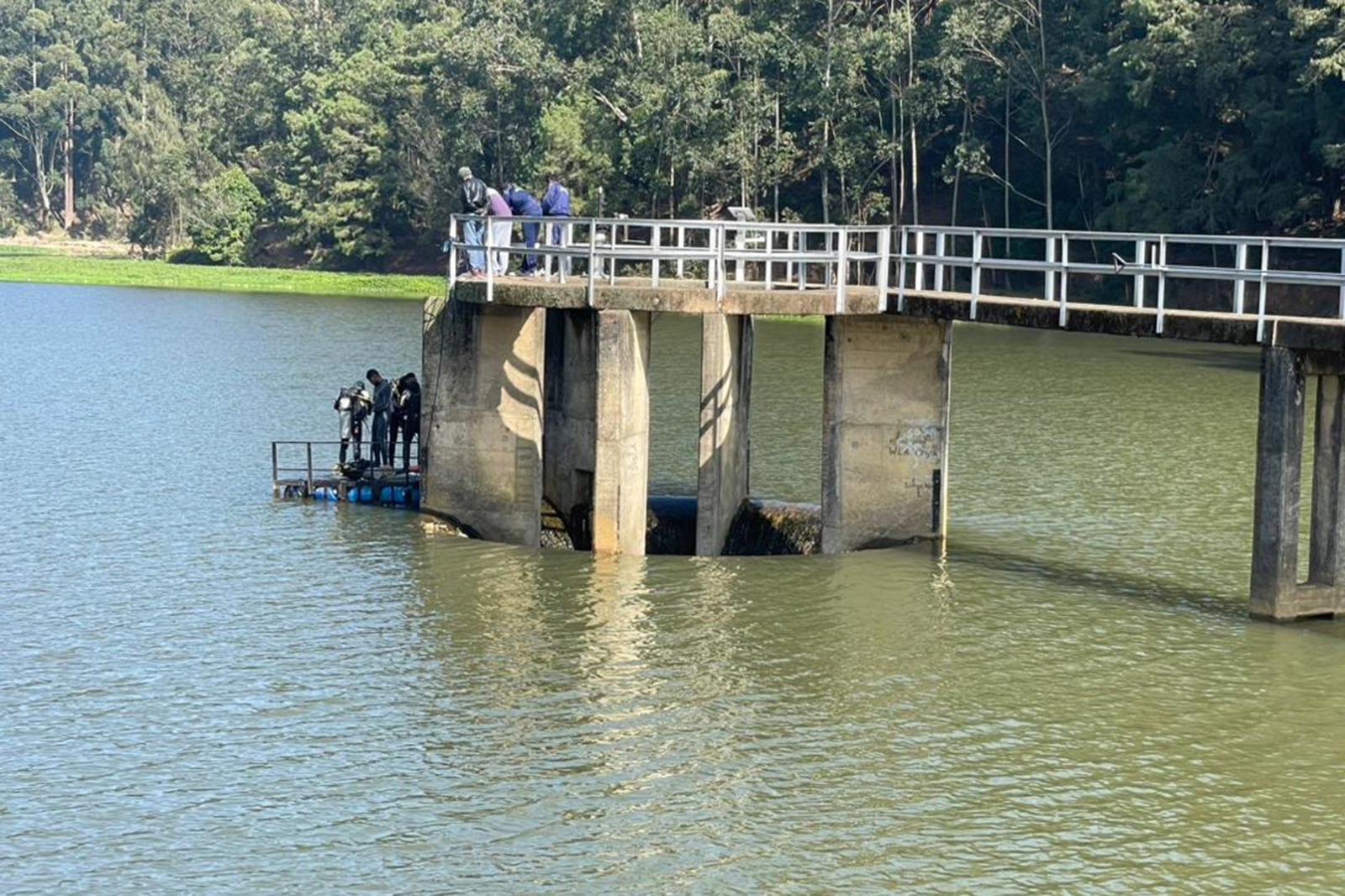
The Sri Lanka Navy successfully conducted a diving operation on 19 Jan 26 to inspect and restore the sluice gate of the Bomburuella Reservoir.
Acting on a request from the Department of Irrigation, the Sri Lanka Navy deployed a specialized diving team from the Western Naval Command, for the urgent requirement.
Through concerted effort, the Navy divers successfully cleared accumulated debris, including a significant quantity of wooden fragments, which had impeded the sluice gate mechanism.
News
PM holds High-Level meetings with EU, UNDP, and corporate leadership at World Economic Forum
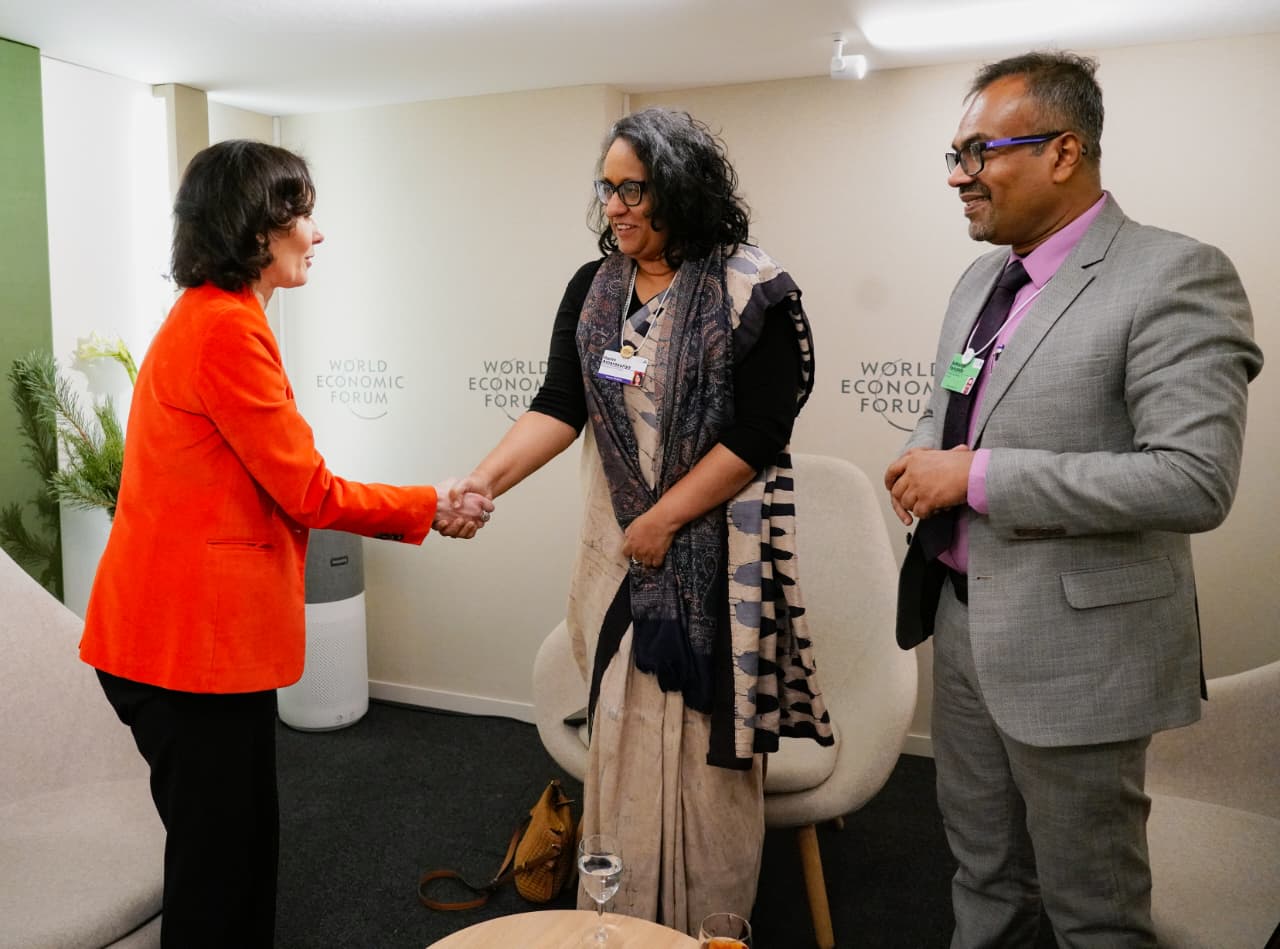
Prime Minister Dr. Harini Amarasuriya held a series of high-level bilateral meetings on Wednesday [January 21] on the sidelines of the World Economic Forum in Davos, Switzerland, engaging with representatives of the European Union, the United Nations Development Programme, and the global private sector.
The Prime Minister met with Hadja Lahbib, European Commissioner for Preparedness and Crisis Management. During the meeting, she expressed Sri Lanka’s appreciation for the support extended by the European Union and its member states following Cyclone Ditwa. The Prime Minister also briefed the Commissioner on the key findings of the World Bank’s GRADE report and requested continued EU support for Sri Lanka’s development and recovery efforts.
Prime Minister Amarasuriya also met with Alexander De Croo, representing the United Nations Development Programme. She expressed appreciation for the longstanding partnership between Sri Lanka and the United Nations and acknowledged the UN’s support in flood relief and livelihood assistance. The Prime Minister noted that, following the mandate received at the parliamentary election, the government is focused on meeting public expectations through national rebuilding grounded in public trust and good governance. She further reaffirmed the Government of Sri Lanka’s commitment to strengthening social protection systems and safeguarding vulnerable communities.
In addition, the Prime Minister met with Robert M. Uggla, Chairman of A.P. Moller Holding. The discussion focused on engagement with the private sector and potential areas of collaboration.
These meetings reflected Sri Lanka’s continued engagement with international partners and global stakeholders to support recovery, development, and long-term economic stability.
[Prime Minister’s Media Division]
-

 Editorial6 days ago
Editorial6 days agoIllusory rule of law
-

 News7 days ago
News7 days agoUNDP’s assessment confirms widespread economic fallout from Cyclone Ditwah
-

 Editorial7 days ago
Editorial7 days agoCrime and cops
-

 Features6 days ago
Features6 days agoDaydreams on a winter’s day
-

 Features6 days ago
Features6 days agoSurprise move of both the Minister and myself from Agriculture to Education
-

 Features5 days ago
Features5 days agoExtended mind thesis:A Buddhist perspective
-

 Features6 days ago
Features6 days agoThe Story of Furniture in Sri Lanka
-
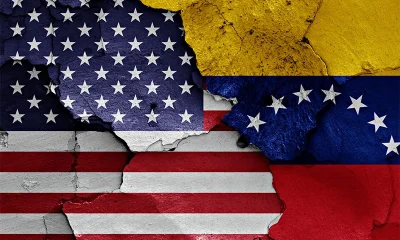
 Opinion4 days ago
Opinion4 days agoAmerican rulers’ hatred for Venezuela and its leaders


